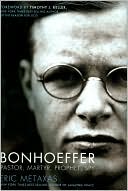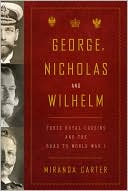The Third Reich at War
An absorbing, revelatory, and definitive account of one of the greatest tragedies in human history\ Adroitly blending narrative, description, and analysis, Richard J. Evans portrays a society rushing headlong to self-destruction and taking much of Europe with it. Interweaving a broad narrative of the war's progress from a wide range of people, Evans reveals the dynamics of a society plunged into war at every level. The great battles and events of the conflict are here, but just as telling is...
Search in google:
The final volume in Richard J. Evans's masterly trilogy on the history of Nazi Germany traces the rise and fall of German military might, the mobilization of a “people's community” to serve a war of conquest, and Hitler's campaign of racial subjugation and genocideAlready hailed as “a masterpiece” (William Grimes in The New York Times) and “the most comprehensive history… of the Third Reich” (Ian Kershaw), this epic trilogy reaches its terrifying climax in this volume.Evans interweaves a broad narrative of the war's progress with viscerally affecting personal testimony from a wide range of people—from generals to front-line soldiers, from Hitler Youth activists to middle-class housewives. The Third Reich at War lays bare the dynamics of a nation more deeply immersed in war than any society before or since. Fresh insights into the conflict's great events are here, from the invasion of Poland to the Battle of Stalingrad to Hitler's suicide in the bunker. But just as important is the re-creation of the daily experience of ordinary Germans in wartime, staggering under pressure from Allied bombing and their own government's mounting demands upon them. At the center of the book is the Nazi extermination of Europe's Jews, set in the context of Hitler's genocidal plans for the racial restructuring of Europe.Blending narrative, description and analysis, The Third Reich at War creates an engrossing picture—at once sweeping and precise—of a society rushing headlong to self-destruction and taking much of Europe with it. It is the culmination of a historical masterwork that will remain the most authoritative work on Nazi Germany for years to come. The Washington Post - Benjamin Carter Hett Evans is clearly up on all the latest research on Nazi Germany, no mean achievement in a field in which tens of thousands of books have been published. But his goal is to appeal to the general reader rather than the professional historian, and he succeeds brilliantly, producing a book that is beautifully written and, despite its length and grim subject matter, easily digestible, even gripping…This is history in the grand style, the kind of large-scale narrative that few historians dare to write these days. It is difficult to imagine how it could be improved upon, let alone surpassed.
\ From Barnes & NobleThis major history is the stand-alone companion to Richard Evans's The Coming of the Third Reich and The Third Reich in Power. A consummate blend of exacting research and fine writing, this narrative history draws on the personal testimony of a wide cross-section of German society, from high-ranking Nazi generals to housewives attempting to stay alive under near-constant Allied aerial bombardment. Like its predecessors, this book reveals the unprecedented national mobilization activated to serve Hitler's war of conquest and racial subjugation.\ \ \ \ \ Walter ReichThe book may well be not only the finest but also the most riveting account of that period. If any work of accurate history has a chance to correct the distortions of public memory, this is it. The story of Germany between its invasion of Poland in 1939 and its collapse in 1945 is a complex one. Its details have been reported in thousands of publications. In this book—the last in a magisterial trilogy covering the entire history of the Third Reich—Evans…brilliantly weaves together the diverse strands of the monumental evil at the heart of that story. The result is a narrative tapestry we can now see whole.\ —The New York Times\ \ \ Benjamin Carter HettEvans is clearly up on all the latest research on Nazi Germany, no mean achievement in a field in which tens of thousands of books have been published. But his goal is to appeal to the general reader rather than the professional historian, and he succeeds brilliantly, producing a book that is beautifully written and, despite its length and grim subject matter, easily digestible, even gripping…This is history in the grand style, the kind of large-scale narrative that few historians dare to write these days. It is difficult to imagine how it could be improved upon, let alone surpassed.\ —The Washington Post\ \ \ \ \ Publishers WeeklyDescribing the Third Reich from the height of its power to its collapse, Evans concludes the masterful trilogy that began with The Coming of the Third Reich and The Third Reich in Power. As in those works, Evans demonstrates a fluent style and a sweeping grasp of the Third Reich's history and of the enormous historical literature. The account is peppered with insightful anecdotes drawn from diaries, letters and speeches. What comes across most clearly is the supreme arrogance of the Nazis and the utterly rapacious character of their rule. Evans gives the Holocaust the centrality it deserves, while also depicting effectively the suffering of Poles and many others under Nazi domination. Evans offers a nuanced picture of the lives of Germans, but ultimately, he suggests, the Nazis' racial ideology thoroughly corrupted German society. Evans narrates the Reich's end in gripping fashion as the Allies closed in on Germany. Evans's fellow historians as well as a broader public will read this work, not quite with pleasure, for there is little joy in this story, but with admiration for the author's narrative powers. Illus., maps. (Mar. 23)\ Copyright © Reed Business Information, a division of Reed Elsevier Inc. All rights reserved.\ \ \ \ \ Library JournalIn this final volume in a history of Nazi Germany, Evans (modern history, Cambridge Univ.; The Third Reich in Power) focuses on the war years and skillfully moves from analyzing grand strategy to the war's local impact. Interestingly, even during the war Hitler maintained his propensity for having subordinates fight one another for supremacy rather than developing an efficient governmental system. By 1942 Hitler, confident in his military genius and disgusted with his generals, appointed himself commander in chief of the Wehrmacht, necessitating an entirely new management style for a man whose prewar administrative skills were at best lackadaisical. Hitler's micro-management of military affairs, down to the tactical level, contributed to later military disasters. Evans, however, does not accept the postwar myth that Germany's war effort was better organized by its generals. Some of the most compelling sections detail how the Nazi conquest derailed the moral compass of so many Europeans. Local populations-in Croatia, for example-enthusiastically adopted Nazi methods of ethnic cleansing to create racial utopias, demonstrating that you cannot separate the war from Nazi racial ideology. Perhaps the best of an impressive series, this book is recommended for all libraries.\ —Frederic Krome\ \ \ \ \ \ Kirkus ReviewsSuperbly written finale to Cambridge University historian Evans's three-volume study of Nazi Germany (after The Coming of the Third Reich, 2004, and The Third Reich in Power, 2005). Hitler had promised, "Give me ten years and you'll see what I've made out of Germany," and early on in the 1940s his subjects had the growing feeling that what he was making was not good. By 1945, one woman recorded, the promise "has for months been his most often-quoted, out of bitterness." Daringly, she burned her Nazi flag, joining a resistance that had been gathering strength since 1943, when, as Evans notes, the French and various Yugoslavian factions, among many other groups, became a real military presence in German-occupied lands. Evans's view is panoramic and thematic. Early in this sprawling book, he recognizes the Nazi "final solution" as a primary motive for war, particularly in the East, and he discusses the Nazi policy of Jewish eradication in chilling detail. Interestingly, the author is always looking for chinks in the armor. He notes, for instance, that Hermann Goring objected to the resettlement of Jews as detrimental to the war economy, even as Nazi typologists were trying to invent categories to admit pro-Nazi poles into the German ethnic ranks. (Uncomfortably for them, Poles in the resistance, by Nazi accounts, tended to have "a significant proportion of Nordic blood.") Evans charts the steadily deteriorating German course of war, from the end of the U-boat campaign in the Atlantic to Stalingrad and the Allied advance into the German homeland. His notes on the denouement-including the incomplete denazification of German government and the arrival into the United States and many SouthAmerican nations of known war criminals-are fascinating as well. But why another book on the Third Reich? Evans closes stirringly: It is necessary to study the Nazi regime as an example of what can happen if-well, let Evans tell that story for himself. A resounding victory in historiography.\ \








